- Home
- A. G. Riddle
The Atlantis World (The Origin Mystery, Book 3) Page 7
The Atlantis World (The Origin Mystery, Book 3) Read online
Page 7
“What convinced you?” David asked.
“Let’s see…” Kate pulled her shirt off. “I think it could have been the part about enjoying the time we have left.”
David kissed her, and she reached for his shirt.
“You’re very convincing, you know.”
“Right…” David was about to slip his shirt off, but he stopped. “Wait. Almost forgot. Paul Brenner is here.”
“What?”
“Yeah, I have no idea. We need to go up top to talk—”
The ship shuddered, throwing David across the room into the bulkhead, Kate landing on top of him.
Her hands were instantly around his head, feeling for blood.
He opened his eyes wide and shook his head once. Sounds and feeling converged, and he could focus again. “I’m okay.”
“The ship’s been hit with explosives,” Kate said.
“What? How do you—”
“My neural implant.”
Another shudder came, but David was ready. He held the desk attached to the wall with one hand, Kate with the other.
“Earthquake?” David yelled, over the din.
“No. I think it was the mines the British laid in the straits. Something pulled them down.”
The ship shook again, this time more violently.
“They’re destroying the ship,” Kate said. “Alpha is unresponsive.”
“Come on.” David pulled her up, and they began staggering through the dark corridors, trying to make their way out.
Paul brushed Mary’s hair out of her face, trying to get a look at the cut the blood was coming from. She opened her eyes, and he drew back instinctively.
“I’m okay,” she said, peering into the empty front seat. “The guards.”
“Gone. Thrown out.”
Water washed into the floor board as Paul unbuckled first his, then Mary’s seatbelt.
“What is it, Paul?”
“No idea.”
“Hurricane?”
“Maybe,” he said, hoping his lie would comfort her.
Mary’s reaction told him she hadn’t bought it. So she did remember something from being married to him.
“Let’s go, we’ve gotta get to higher ground.”
Mary grabbed her laptop bag.
“Leave it, Mary.”
“I can’t—”
“It’ll be soaked and only slow us down. We have to go.”
He pulled her out of the Jeep and into the muddy road, where a wall of wind and rain caught them, throwing them to the ground and rolling them twice before it abated.
Paul got to his feet and caught his first full view of the chaos below, what had been Ceuta only seconds ago.
He saw the expression on Mary’s face, and that steeled him enough to grab her, turn her around, and yell, “Run.”
CHAPTER 13
The explosions were less frequent now, but David and Kate still ran cautiously.
“What could do this?” David asked.
“A tsunami could have washed the mines into the ship.”
David’s mind flashed to his conversation with Sonja. A tsunami—at the exact time of the Immari global attack? He didn’t believe in coincidences. “Ares and Dorian did this.”
“How?”
“The ice in Antarctica. They melted it. Does the ship there have any weapons?”
“No. Wait. It has emergency mines for asteroids and comets.”
“Could they melt ice?”
“Definitely. Comets are mostly ice.”
“How do you know that?”
Kate slowed her pace. “I don’t.” She thought for a second. “I know it because she did. That’s weird.” The tidbit about comets had come naturally to her—like her own memories. Previously, when she had cured the plague, she had focused on the science; remembering her Atlantean counterpart’s knowledge had been an effort.
“Let’s keep moving,” David said.
They raced through the corridors, occasionally stopping to grab a bulkhead when an explosion rocked the ship.
At the surface, David instantly sensed how bad things were. It should have been morning, and the sun should have greeted them, but it was dark, almost pitch black, and he couldn’t see a single star. The sound of destruction was complete: waves crashed into the rocks below, buildings crumbled in the distance, and thunder echoed across the sky and in their chests.
They stood for a moment, the hard-falling rain numbing them.
David leaned over and shouted, his voice barely audible against the clamor. “Get below. I’m right behind you.”
He ran into the clearing, past the pallets of supplies. At the base of the mountain, at sea level, the crumbling ruin that had been the fortress of Ceuta was sustaining an onslaught beyond imagination.
The base was almost completely submerged; only a few buildings jutted out, but they were falling fast.
The jet that would have carried them away lay overturned, several hundred feet from the runway, which was also flooded.
The rain came in sheets, and David fought to keep it out of his face and his eyes open.
From his peripheral vision, he saw movement. Milo and Sonja. They ran to him, and the three of them took cover under the trees, just past the clearing. The wind gained steam, forcing each of them to reach for a tree, holding tight, bracing as it picked up speed.
“I came up to look for you,” Milo shouted.
“That was smart,” David said. “You did good.”
Sonja leaned close to his ear. “It would seem we’ve underestimated our enemy.”
“Badly.”
Behind them, David heard a sucking noise that seemed to drain all the air and sound away. The rain nearly ceased. Through the darkness, he saw a wall of water rising, bearing down on the mountain. It would wash over it, taking everything—and everyone with it.
Paul could feel the cool water level rising, moving up his legs, like a countdown to his and Mary’s death.
He tried to pump his legs faster, but it was like doing water aerobics in the shallow end of a mountain lake.
Mary was falling behind.
“I need to stop,” she said, bending over to heave breath after breath.
Paul tried to estimate the distance to the top of the peak. Two, maybe three hundred yards?
The rain had almost stopped. Maybe the massive storm was ending. But the water still crept up his legs—it was almost to his knees now. If it leveled out eventually, maybe they could swim to land, pausing to rest by hanging on to the tree tops or floating debris from Ceuta.
But if the water topped the mountain, their only option would be to find something to make a raft out of and try to make landfall further inland. But where would the new coastline form? Miles, hundreds of miles away?
A sound, over the ridge—like the Earth was taking a deep breath. Paul could feel the wind rushing past him, flowing out to sea.
“Come on,” he grabbed Mary’s hand and pulled her toward a ridge, pushing his legs through now knee-deep water. It was all Paul could do not to reel back when he saw the wall of water rushing over the sea.
He thought Mary was going to release his hand for a moment, but she squeezed harder.
Paul looked from the mountain to the valley—which was fully submerged. They could run back, try to get under water, hold on to something. Would that be safe? He had absolutely no idea.
Or they could run to the mountain top. If the wave topped it…
He made his decision.
He tugged at Mary’s hand, and she followed as fast as she could, not saying a word.
He pushed harder, feeling her strength draining as well as his own.
Finally, she fell in the water, and Paul jerked her up. “Keep going,” he said, wrapping his arm around her, half-carrying her as her legs walked and kicked the water.
Ahead, the forest stopped and a clearing spread out. It wasn’t the top of the mountain, but…
Figures, moving, heading toward a rock outcroppin
g.
“Help!” Paul yelled. He released Mary, and she collapsed into the water on her hands and knees. Paul rushed forward, waving his arms back and forth in the air. “Hey!”
The figures stopped, then two of them were racing towards him, cutting through the water with breathtaking speed. The man was tall, over six feet and well-built. A soldier. And so was the woman, though she was trim, her skin dark caramel.
The man put his shoulder into Paul’s stomach and hoisted him up, holding him by his legs while speeding back to the clearing, only slightly slower with Paul’s added weight. Paul saw the woman lift Mary the same way, and then they were close behind them.
A skinny Asian teenager with short black hair was grabbing small packages out of massive crates stacked on pallets in the clearing.
“Time to go, Milo,” the man called.
He set Paul down, and the woman released Mary. Their rescuers ran full on toward a rock wall and… disappeared.
The Asian teenager stopped just before it and waved his hand. “Come on.” He turned and walked through the rock.
Paul and Mary charged after them and right through the wall, which was clearly a hologram of some kind.
The area beyond was almost pitch-black, save for a tiny glowing yellow light at the end of the tunnel, like a train in the far distance.
“Come on!” A voice ahead of them called.
Paul again grabbed Mary’s hand, and they lumbered through the dark on their exhausted legs.
The impact of the wave was deafening. Paul felt as though he were in the barrel of a gun that had been fired. The blow threw him and Mary against the left wall. They rolled to the ground, and water rushed over them. The shaft was on a downward incline. It would fill…
Paul again felt hands on him, and he was up, floating through the shaft, the soldier carrying him.
The yellow light grew brighter and the splash of water louder until he saw a set of doors part, and the five of them were out of the shaft, into an elevator of some sort. The man worked a panel that closed the doors quickly, but there was still three feet of water in the elevator. He seemed not to care. The lights in the elevator flickered, and it shuddered a few times. Paul wasn’t sure if it was losing power.
He leaned against the wall, trying to take stock of his injuries. He hurt all over, and his muscles throbbed. It was hard to isolate any particular malady.
“I’m Paul Brenner,” he said, to no one in particular.
“I thought you might be,” the soldier said. “I’m David Vale.”
“Thank you for saving us… twice.”
“No problem.” He stared at the water. “Just doing my job.”
The teenager smiled at Paul. “I’m Milo.”
The elevator doors opened, emptying the water into a dry hallway where a woman stood. Paul recognized her. He had seen her in months of videos during the Atlantis Plague clinical trials, talked to her several times on the phone, but he had never seen Kate Warner in person until this moment.
CHAPTER 14
Paul unfolded the crisp, dry clothes Kate had provided and began stripping off his soaked shirt and pants. He threw them on the narrow bed and used the pillow to sponge some of the water off his body. He was so soaked he wondered if he’d ever be dry again.
“You knew about this?”
Mary was staring at him, still wearing her own soggy clothes, ignoring her clean set on the desk. They were alone in the small bedroom, and her voice boomed in the space.
“I did.”
“When we were married?”
Paul could see where this was going. “I’ve known for twenty years—”
“You… knew about an alien spacecraft, buried outside Gibraltar, for twenty years, including the entire time we were married, and you said not one word about it to your astronomer wife who spent day and night searching for any shred, any minute sign of alien life?”
“Mary—”
“The sort of betrayal and lack of trust—”
“I took an oath, Mary. I knew the vessel existed, but I’ve never been inside until now. I knew nothing about it. I still don’t. My part of the Continuity consortium was fighting the plague.”
“They’re connected?”
“Yes. The plague originated from this vessel, from the sentry device. It was extracted in 1918.” Paul paused, watching Mary take off her clothes. “I’ll wait outside.”
“Stay. I want to hear this—while we’re alone.”
“I can…”
“It’s nothing you haven’t seen before, Paul.”
Paul turned around just the same, and he could almost feel Mary smiling at his modesty.
“So whoever built this vessel caused the plague?” she asked.
“Yes. The Atlanteans have been conducting genetic experiments, guiding human evolution for seventy thousand years—since the Toba Catastrophe that almost caused humanity’s extinction. We think the Spanish flu in 1918 was a mistake on their part, caused by the radiation from one of their devices, the Bell. Kate Warner, the woman you met, cured the plague. She’s the daughter of a World War I soldier who found the Bell. During the Spanish flu, he placed her mother, who had died during the outbreak, in a resurrection tube in another section of this vessel. Kate was born in 1978. Her father went missing in the eighties. Dr. Martin Grey adopted her. He was the organizer and chairman of the Continuity group. He recruited me in the early nineties at a conference I attended. He died during the plague.”
“You trust these people?”
Paul glanced back. “Yes. Well, Kate and after the rescue on the mountainside, I’d say I trust the others as well.”
“You think we should share what we know with them?”
“I do. There’s something else. Continuity, the plague, that’s what I was always working on.”
Mary was silent for a moment. “In that case, I would say it was worth it.”
Paul watched her glide through the double doors and out into the corridor.
He had been certain that it was worth it too—until this moment.
Kate was reviewing the results of a full ship diagnostic when Paul and Mary entered the conference room wearing the dry clothes she had provided.
David, Sonja, and Milo were huddled at the end of the raised table, sorting their MREs, weapons, and supplies. Paul spoke to David first. “Thank you again for saving us out there.”
“No problem.”
“We’d like to share something, the reason we came here,” Paul said, then nodded to Mary.
Mary introduced herself and her background: a radio astronomer focused on finding and analyzing signs of extraterrestrial life.
“About two weeks ago, the radio telescope picked up an organized signal. A code.”
“That’s impossible,” Kate said.
“I verified it myself.”
“You have a copy of the signal?”
“Yes.” Mary held up a USB key. “It has two parts. The first part, a binary sequence, is two numbers: Earth’s exact location. The second part is a code made from four values.”
Kate tried to access Alpha’s link to the beacon, hoping to verify the signal.
David seemed to know what she was doing. He gave her a look that said, Pay attention to our guests.
Paul spoke before she had a chance. “Why did you say it was impossible?”
“Two Atlantean scientists came here one hundred fifty thousand years ago to study the early humans on this planet. As part of their routine procedures, they deployed a beacon. It filters the light we can see and blocks any signals either to or from Earth.”
Kate thought Mary was on the verge of crying. “What’s wrong?” Kate asked.
“Nothing… that’s just my soul collapsing like a neutron star,” Mary said.
Kate thought the comparison was a little dramatic.
“Why did they deploy a beacon? Why hide?” Paul asked.
“Protection. The scientists were aware of several threats in the galaxy—”
&nbs
p; “What kind—” David began, but Kate cut him off. “I don’t know. Not part of my memories.”
Before anyone could ask, Kate explained that through a twist of fate, she had been born in 1978 with one of the Atlantean scientist’s memories—the ones the other scientist, Dr. Arthur Janus, had wanted his partner to resurrect with.
“So…” Mary said. “The scientists or you—”
“The scientists,” Kate corrected. “I’ve only seen memories of what they did.”
“Right. Were they protecting us or themselves with the beacon?”
“Both.”
“So how did this signal get through?”
Kate used her link to Alpha to connect to the beacon. The orbiting communications station had recorded an incoming signal and allowed it to pass. And there was something even more surprising. “It’s true, there was a transmission two weeks ago. One outgoing. A message sent from the beacon.”
“Who?” David asked.
“It had to be Janus,” Kate said. “When you and he entered the Atlantean ship to rescue me. When Dorian rescued Ares.”
“Can you see his transmission?” David asked.
“No. I should be able to, but access to the message is restricted from here. I don’t know why. The damage to the ship may have disrupted the interface.”
“What’s the other signal?” Mary asked.
Kate tried to access the entry on the beacon, but it too had restricted access. But… “It’s Atlantean.”
“How is that possible?” David asked.
“It’s not.” Kate explained that the Atlantean homeworld had fallen fifty thousand years ago, and the sole survivors of the war had sought refuge here on Earth, under the protection of the beacon, where their enemy couldn’t find them. General Ares, an Atlantean soldier, had brought the refugees here. Ares had joined the two scientists, colluding with Janus’ partner in secret to control human evolution. Ares had ultimately betrayed the scientists, killing Janus’ partner and injuring and trapping Janus.
“So Janus sent a transmission to someone—presumably an Atlantean,” David said, “and it sounds like he got a response—that’s how it got past the beacon.”

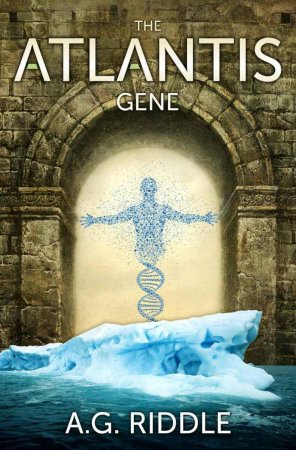 The Atlantis Gene: A Thriller
The Atlantis Gene: A Thriller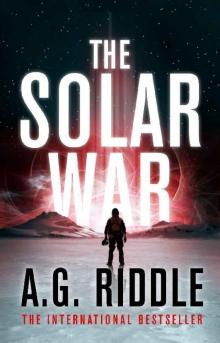 The Solar War (The Long Winter Book 2)
The Solar War (The Long Winter Book 2) The Extinction Files Box Set
The Extinction Files Box Set The Atlantis Trilogy Box Set- The Complete Series
The Atlantis Trilogy Box Set- The Complete Series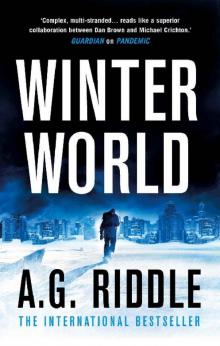 Winter World
Winter World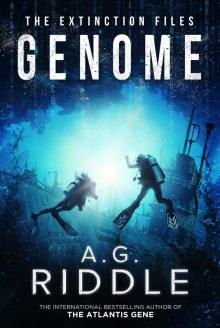 Genome
Genome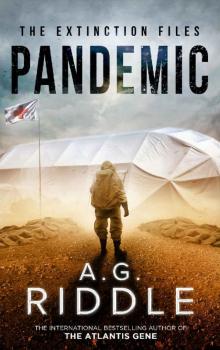 Pandemic (The Extinction Files Book 1)
Pandemic (The Extinction Files Book 1)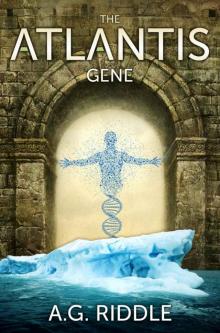 The Atlantis Gene: A Thriller (The Origin Mystery, Book 1)
The Atlantis Gene: A Thriller (The Origin Mystery, Book 1)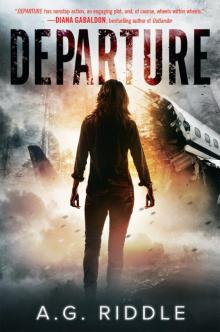 Departure
Departure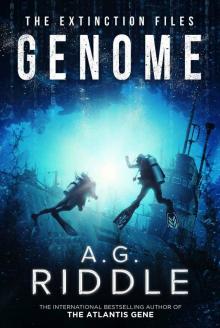 Genome (The Extinction Files Book 2)
Genome (The Extinction Files Book 2)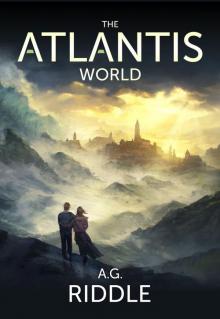 The Atlantis World (The Origin Mystery, Book 3)
The Atlantis World (The Origin Mystery, Book 3)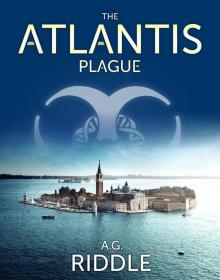 The Atlantis Plague: A Thriller (The Origin Mystery, Book 2)
The Atlantis Plague: A Thriller (The Origin Mystery, Book 2)